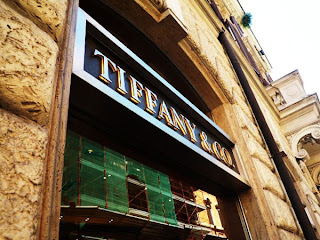The company headquarter's location, which is the Upper East Side of Manhattan, was chosen based on analysis of the area's socioeconomic characteristics. Mainly, the upper class people reside in the area which means that the store is located right in the heart of the luxurious life. Also, the store is positioned on the 5th Avenue, which is the city's main shopping site for tourists.
As mentioned before, Tiffany's prices are pretty high which means that the gross margin is high as well. Plus, it's another indication of the quality's level and its prestigious image.
My experience visiting the store was pleasant and useful. Acquainted with the most influential factors in creating a store's atmosphere, I paid close attention to the store's organization:
My experience visiting the store was pleasant and useful. Acquainted with the most influential factors in creating a store's atmosphere, I paid close attention to the store's organization:
- Employee type and density: Sales assistants are very friendly, mannered and knowledgeable about the product. There are a few workers at each counter so customers do not have to wait for the next available one. They are ready to answer to all your questions. Definitely, with this type of organization the customer cannot be overlooked and will be given sufficient time and help to make the right choice when shopping.
- Merchandise type and density: All merchandise is displayed in a tasteful and uncluttered arrangement. Every type of product such as china, leather goods, engagement rings are placed in a certain room or floor. So if a customer knows exactly what he is looking for, he knows where to go. Each item is set in the way that a customer can appreciate its beauty.
- Fixture type and density: Fixture is classic, elegant and simple. The flagship store kept the 19th century look.
- Sound: I noticed there was playing a flowing and unobtrusive music to create a relaxing atmosphere.
- Visual factors: Dominant colors of the interior are different tones of brown which is a warm color. Thus, it creates a feeling of warmth and coziness. As the character from "Breakfast at Tiffany's," Holly Golightly, said, "The only thing that does any good is to jump in a cab and go to Tiffany's. Calms me down right away. The quietness and the proud look of it; nothing very bad could happen to you there."




